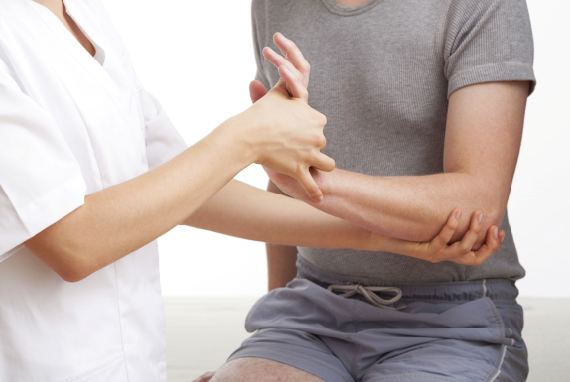
Why do I need therapy after having a cast?
 For many people following a fracture or sprain of the wrist, one of the treatment options is immobilization. This frequently involves casting of the extremity to prevent movement and to allow healing to occur. This casting can last from a few weeks to months. During the time that you're casted, the rest of your body is moving and doing its usual activities. This is accomplished through compensating with the other hand, by moving other parts more, or by getting help from family or friends. When the cast comes off you're ready to return to life as usual, but you find that you may still be having trouble.
For many people following a fracture or sprain of the wrist, one of the treatment options is immobilization. This frequently involves casting of the extremity to prevent movement and to allow healing to occur. This casting can last from a few weeks to months. During the time that you're casted, the rest of your body is moving and doing its usual activities. This is accomplished through compensating with the other hand, by moving other parts more, or by getting help from family or friends. When the cast comes off you're ready to return to life as usual, but you find that you may still be having trouble.
This trouble with activities comes from the compensatory techniques that you used during the casting period. The body has learned new movement patterns to complete everything. Because of these “bad habits” you can't turn your palm up and down, or grip and twist with the hand. This is when therapy can be most helpful. We are able to identify the compensations and poor movement patterns and then teach exercises to correct them. I would like to describe three of the most common “bad habits” I see as a hand therapist.
Starting at the forearm, you need to be able to rotate the palm up and down to turn doorknobs, accept change, and even feed yourself. After casting, many people lose this rotation because they have compensated with their body or by moving the elbow. This prevents the two bones from rotating around each other and letting you turn the palm. By keeping the body stationary and preventing the elbow from helping, you can regain most of the normal motion.
Moving down, we come to the next restricted area at the wrist. With many casts that immobilize the forearm and wrist, the fingers are left free to move. This freedom keeps the finger muscles awake and active to help keep swelling out of the hand. The negative is, when the cast is removed the finger muscles are well trained and ready to go. They try to help with everything, including wrist motions, so when you bend the wrist back the fingers want to help with the motion. This makes it very difficult to grip and hold anything. The wrist muscles need to operate the wrist, so your finger muscles can do the job of gripping.
The final compensation we see is at the fingers. Although they are left free in many casts the movement pattern changes. We normally initiate bending into a fist at the tips of our fingers. However after being casted many people change this pattern due to swelling, pain, or stiffness, they initiate the motion in the large joints at the base of the fingers. This small change can make it very difficult to grip tightly or to hold onto small objects. With cues and a few exercises, this habit can be broken. By starting motion at the fingertips you are able to pull the fingers all the way into a tight fist.
Hopefully this helps to explain a few of the “bad habits” you can learn after being in a cast. Our bodies are very efficient at finding a way to do things when one part is limited. The problem lies in our difficulty to unlearn these compensatory patterns. This is one of the benefits of seeing a therapist. We can identify the problems and help you find the solution to regaining your independence.